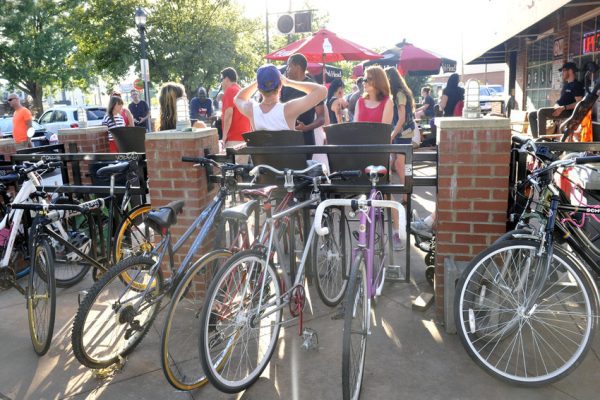To create a bike culture, Charlotte needs …

[highlight]Would more Charlotteans bicycle more often if the city had more bike lanes? More bike lanes protected from traffic? Or more off-road paths, such as greenways? Would showers and bike lockers at more workplaces encourage more bicycle commuting? Maybe, instead, the most important thing to do is offer better education, for motorists and cyclists, so everyone gets along better.[/highlight]
With more people cycling in Charlotte, and a significant increase in the miles of bike lanes and off-street bike routes, a movement is emerging to make the Queen City into a more bicycle-friendly city.
The John S. and James L. Knight Foundation and the Lee Institute hope to encourage wider discussion about cycling in Charlotte, starting with a Cycling Summit and Community Conversation, 4-6 p.m. Nov. 17 at the Mahlon Adams Pavilion at Freedom Park.
That event is at capacity, the Lee Institute reports, but the Knight Foundation plans a second, similar event, likely in early 2015. Those interested in attending that session may email the Knight Foundation’s Charlotte program officer, Susan Patterson, patterson@knightfoundation.org. To be put on a waiting list for the Nov. 17 event, contact Caitlin Ford at the Lee Institute, cford@leeinstitute.org, or call 704-632-6714.
It’s not easy to get an exact count of the number of people cycling in Charlotte, but the city can point to far more miles of on-street bike lanes – 79 miles today – compared to only 1 mile in 2003. In addition, the city now has 45 miles of greenways and off-street paths. (See “Charlotte quietly improves streets for cyclists.”)
Bicycling fans and bicycle planning experts suggest a variety of possible next steps. John Cock, a Davidson-based bicycle planner for Alta Planning + Design, points to the “Five E’s” from the “bike-friendly cities” program of the League of American Bicyclists. (Charlotte is a bronze-level bike-friendly city.) The Five E’s are engineering, education, encouragement, enforcement, and evaluation and planning.
“Charlotte has done well over last decade on the engineering,” Cock said, meaning increasing the miles of bike lanes and other infrastructure. He said the next leap for the city will be all the other things that create a bike culture.
He mentioned things such as open streets events, the city’s B-cycle bike share program, Safe Routes to School programs, and “the marketing and branding and just making people think this is cool to do, so they associate Charlotte with biking, so they think it’s socially acceptable, you know?”
Even so, said Cock, who came to Charlotte about 20 years ago, “I think the bike culture is the richest that it has been in Charlotte for at least the last 20 years.”
The Knight Foundation has also sponsored a trip to Copenhagen for four Charlotte civic leaders, (See Patterson’s essay, “Creating a more connected Charlotte”) and encouraged Charlotte Center City Partners to organize an Oct. 15 ride through center city Charlotte and South End for additional top-level elected and business leaders.